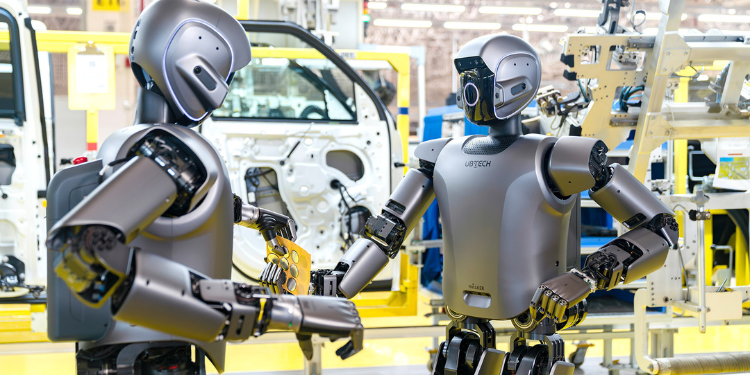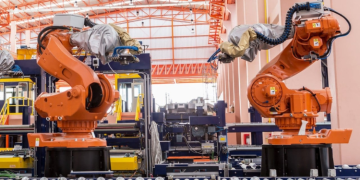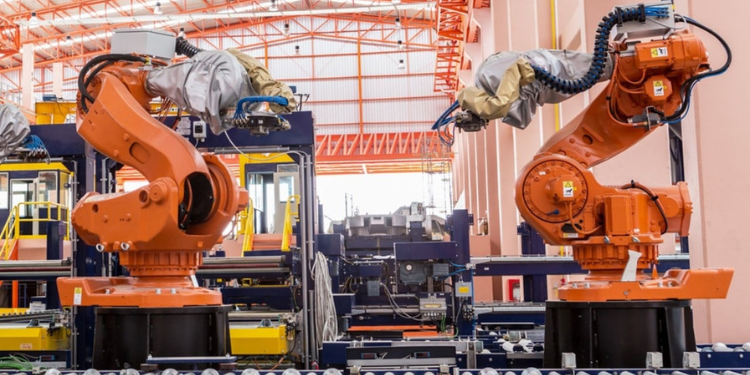Factories in the United States are not what they used to be. Years ago, they were loud, messy, and filled with people doing heavy work. The smell of oil filled the air, and machines rattled nonstop. Workers carried boxes, lifted loads, and tried to keep up with demand. It was hard, dangerous, and often exhausting.
In today’s modern factory, the air is clean and machines hum softly. Robots move with precision, lifting boxes, sealing packages, and stacking goods with great accuracy. Workers stand nearby, not worn down, but focused on guiding the machines and checking quality. Doesn’t that feel like a different world? What caused this dramatic shift?
Smarter manufacturing. Robots, automation, and artificial intelligence are reshaping how goods are manufactured in America. These tools are not science fiction. They are here right now, working in food plants, car factories, and packaging companies, solving problems that families and businesses face daily. They make food safer, help in stocking shelves, and protect workers from injuries, just the kind of progress we want.
Think about your own life. When you order snacks online, you expect them to arrive fresh and sealed. When you buy toys for your kids, you expect safe packaging. When you pick up medicine, you expect child-resistant containers. None of that happens by chance. Behind the scenes, smarter machines make sure those needs are met. This is the story of how American factories are changing to meet the demands of modern life.
Robots That Work Smarter, Not Harder
Factories once depended on people for every step. The jobs were tough on the body and often unsafe. Injuries were so common, and production was slow. But what if there was a better way?
Robots have stepped in to take on the hardest and most repetitive jobs. At auto plants, robots weld car parts with perfect precision, working day and night without breaks. In food factories, robots sort and pack products quickly, making sure every package looks the same. They don’t get tired and avoid the mistakes humans might make after long hours.
- Robots lift heavy loads without risk of injury.
- Machines pack goods neatly and safely at top speed.
- Workers focus on problem-solving, innovation, and quality control.
Does this mean robots replace people? Not at all. They support workers by handling the dangerous, exhausting jobs. This teamwork makes factories safer and more efficient. Families get better products, and workers go home safe at the end of the day.
The Power of Automation
Ever wondered how online stores like Amazon keep products moving so quickly? Or how supermarkets never seem to run out of everyday items? The answer is automation, where machines handle tasks that would take people too long to complete.
In modern factories, conveyor belts, smart sensors, and automated packagers keep production flowing. At snack companies, automation bags, seals, and boxes chips at lightning speed. At drink plants, machines fill and cap thousands of bottles an hour without missing a beat.
Without automation, production would slow, and shelves would run out. Automation keeps shelves stocked, delivers online orders on time, and keeps products safe upon arrival. Isn’t that the kind of system everyone counts on?
Also Read: Microsoft Launches Farmer-Focused AI That Understands Swahili, Kikuyu, Dholuo and More
AI Brings Smart Thinking to Machines
Smart manufacturing is giving machines decision-making abilities. Robots can move, but artificial intelligence gives them brains. AI helps machines “learn” by spotting patterns and predicting problems. Imagine a machine that can see a cracked bottle on the line and remove it instantly.
AI is already at work in many industries. In packaging, AI checks seals, labels, and barcodes for errors. In food plants, it predicts when equipment needs cleaning or repairs, preventing problems before they occur. In clothing factories, it tracks inventory to make sure popular items never run out.
With AI, factories catch mistakes before products leave the line, reducing waste and saving resources. They deliver higher-quality goods to customers.
Also Read: Putin Mulls Importing 12,000 North Koreans to Work in Drone Plant
Safer Food and Packaging for Families
Food safety is one of the most important parts of daily life. Nobody wants to worry about spoiled food or unsafe packaging. Smarter machines seal food tightly, keeping out air and germs. They pack items so they last longer on the shelf. They check for leaks, cracks, and weak spots before products leave the factory.
The packages go through machines that meet strict safety standards. Genesis Pack, for example, uses food-grade materials and equipment designed for safe handling. Their machines are built to keep food clean from start to finish.
Parents can feel confident bringing these products home. Children enjoy fresh snacks, and families trust the meals on their tables.
Custom Solutions for Every Need
Not every company makes the same product. A snack maker needs different machines from a cleaning supply company. That’s why custom solutions matter. One-size-fits-all doesn’t work in today’s world.
Genesis Pack offers specialized machines for different industries. In medicine, they create child-resistant packaging to keep families safe. For dairy and meat companies, they design wash-down equipment that stays clean and sanitary. Large food companies build bulk packaging systems that keep production fast and efficient.
These solutions help businesses stay competitive.
Factories are more than machines and buildings. They are about people, families, and entire communities with smarter manufacturing making jobs safer and more rewarding. It creates opportunities for workers to learn new skills, helps businesses grow stronger, and makes products safer and more reliable for families everywhere.
Follow our WhatsApp Channel and X Account for real-time news updates
Peter Ongera is an opinion contributor for The Kenya Times. His views are his own and do not necessarily reflect those of The Kenya Times or its affiliates. This article is published in partnership with MSN News.











































































